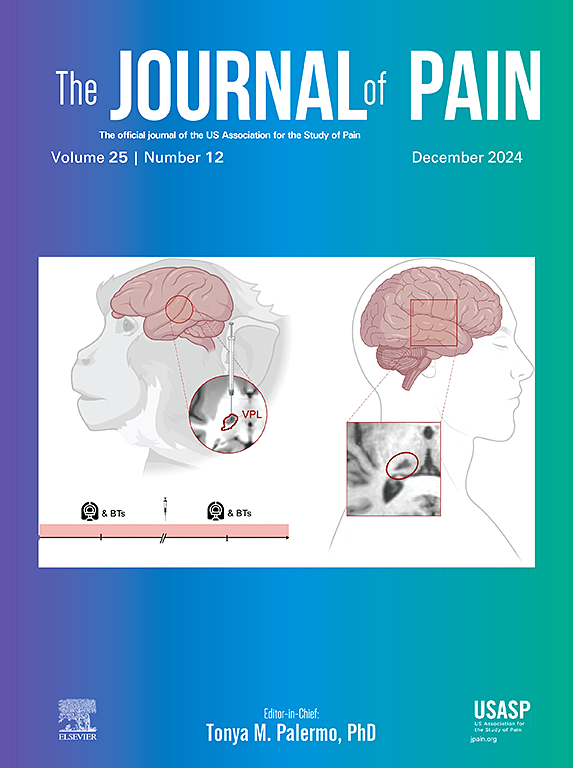A group-based, online-delivered pain management programme (iSelf-help) is not inferior to a group-based, in-person programme in reducing pain-related disability for people with persistent pain: A non-inferiority randomised, two-arm, parallel, open-label trial
IF 4
2区 医学
Q1 CLINICAL NEUROLOGY
引用次数: 0
Abstract
A group-based, online-delivered version (iSelf-help) of an existing group-based in-person pain management programme was developed. Development included Māori (New Zealand’s Indigenous population) cultural considerations of content. This study determined whether offering iSelf-help was non-inferior to the in-person pain management programme in reducing pain-related disability at six months. The study used a non-inferiority randomised, two-arm, parallel, open-label trial with blinding of assessors, including health economic and process evaluations. Participants were adults (age≥18 years) with persistent non-cancer pain referred to a hospital-based regional pain service who were deemed eligible for a pain management programme. iSelf-help groups participated in two 60-minute video-conferencing sessions (first, peer support facilitated; second, clinician facilitated) weekly for 12 weeks with access to resources via smartphone app and website. In-person groups received 12-week in-person pain management programme. The primary outcome was the Modified Roland Morris Disability Questionnaire. Secondary outcomes included anxiety, depression, stress, pain severity and interference, health related quality of life, self-efficacy, acceptance, and satisfaction. Recruited were 113 participants (56 iSelf-help, 57 in-person), mean(SD) age 38.2(13.7) years, 75% female, 16% Māori. Using modified intention-to-treat analysis on the primary outcome at six months (n=73), iSelf-help was non-inferior to in-person pain management programme with a point estimate (95% one-sided CI) of −0.4 (∞, 1.5). It was also non-inferior for secondary outcomes of anxiety, depression, stress, activity interference, health related quality of life, and self-efficacy. iSelf-help was cheaper, had similar overall satisfaction, but higher accessibility, scores. iSelf-help showed non-inferior clinical outcomes for improving pain-related disability in people with persistent non-cancer pain.
Perspective
This article evaluates a novel online-delivered pain management programme (iSelf-help) co-created with people with persistent pain, with committed and ongoing collaboration with Māori whānau (Indigenous population of New Zealand). iSelf-help may improve access to the regional pain service used in this study for more people living with persistent pain.
一项基于群体的、在线提供的疼痛管理项目(自我帮助)在减少持续性疼痛患者的疼痛相关残疾方面并不亚于基于群体的、面对面的项目:一项非效性随机、双臂、平行、开放标签的试验
开发了现有的以小组为基础的面对面疼痛管理方案的基于小组的在线交付版本(自助)。发展内容包括Māori(新西兰土著人口)文化方面的考虑。本研究确定在六个月时提供自我帮助在减少疼痛相关残疾方面是否优于面对面的疼痛管理方案。该研究采用非劣效性随机、双组、平行、开放标签试验,评估者采用盲法,包括健康经济和过程评估。参与者为持续非癌性疼痛的成年人(年龄≥18岁),转介到医院的区域性疼痛服务机构,被认为有资格接受疼痛管理方案。自助小组参加了两次60分钟的视频会议(首先,促进了同伴支持;第二,临床医生每周通过智能手机应用程序和网站提供资源,为期12周。现场组接受为期12周的现场疼痛管理方案。主要结果是修改后的罗兰莫里斯残疾问卷。次要结果包括焦虑、抑郁、压力、疼痛严重程度和干扰、健康相关的生活质量、自我效能、接受度和满意度。招募113名参与者(56名自助,57名亲自),平均(SD)年龄38.2(13.7)岁,75%为女性,16%为Māori。对6个月时的主要结局(n=73)进行改良意向治疗分析,自助治疗不逊于面对面疼痛管理方案,其点估计(95%单侧CI)为- 0.4(∞,1.5)。在焦虑、抑郁、压力、活动干扰、健康相关生活质量和自我效能等次要结果方面也不逊色。自助更便宜,总体满意度相似,但可获得性更高。自我帮助在改善持续性非癌性疼痛患者的疼痛相关残疾方面显示出非劣势的临床结果。这篇文章评估了一个新的在线传递的疼痛管理项目(自助),该项目是与患有持续性疼痛的人共同创建的,并与Māori whānau(新西兰土著人口)进行了承诺和持续的合作。在本研究中,对于更多患有持续性疼痛的人来说,自我帮助可能会改善获得局部疼痛服务的机会。
本文章由计算机程序翻译,如有差异,请以英文原文为准。
求助全文
约1分钟内获得全文
求助全文
来源期刊

Journal of Pain
医学-临床神经学
CiteScore
6.30
自引率
7.50%
发文量
441
审稿时长
42 days
期刊介绍:
The Journal of Pain publishes original articles related to all aspects of pain, including clinical and basic research, patient care, education, and health policy. Articles selected for publication in the Journal are most commonly reports of original clinical research or reports of original basic research. In addition, invited critical reviews, including meta analyses of drugs for pain management, invited commentaries on reviews, and exceptional case studies are published in the Journal. The mission of the Journal is to improve the care of patients in pain by providing a forum for clinical researchers, basic scientists, clinicians, and other health professionals to publish original research.
 求助内容:
求助内容: 应助结果提醒方式:
应助结果提醒方式:


